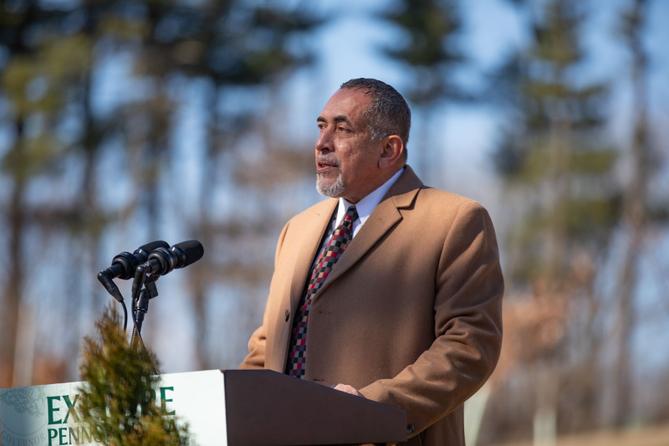READING — Large-scale immigration raids haven’t hit a Pennsylvania county with a large Latino population, but the community, employers, and advocates are on high alert as enforcement ramps up across the country.
Nearly 200,000 of the more than 1 million immigrants living in Pennsylvania are undocumented, according to an analysis of 2023 census data by the American Immigration Council. In Berks County, there were 7,000 unauthorized immigrants in 2019, the Migration Policy Institute estimated.
But the area is also home to thousands of U.S. Citizens who are Puerto Rican or naturalized citizens born in the Dominican Republic, Mexico, and other countries. ICE has wrongfully detained Latino citizens in other states.
On the ground, advocates for immigrants say there’s a general atmosphere of fear as ICE detains people at the county courthouse, adults skip English language classes, employers fire people whose immigration status is up in the air, and more.
Since President Donald Trump took office on Jan. 20, ICE administrative arrests and detention have skyrocketed. Guided by the president’s promise to deport 1 million immigrants in one year, ICE has carried out large-scale raids in California, Florida, Illinois, New York, Texas, and other states with high immigrant populations, often targeting cities that tout immigrant-friendly policy and openly reject local law enforcement cooperation with ICE.
At the same time, the administration has canceled or severely limited programs that allow immigrants to be in the country legally. Temporary Protected Status (TPS) and other humanitarian parole programs are set to end later this year. The U.S. Refugee Admissions Program is suspended indefinitely.
ICE arrests are up nationwide, including here in the commonwealth. There have been 13 daily arrests on average since Trump’s inauguration, an increase of 249% from 2024, a New York Times analysis found.
In the nearby Lehigh Valley, ICE arrested 17 people in June who were working on an unoccupied property for “immigration violations.” That same month, 14 people were arrested in the Pittsburgh area and three in northeast Pennsylvania during similar raids.
Norristown, in Montgomery County, has also been particularly hard hit by raids and arrests.
While large-scale arrest operations have not been the norm in Berks, there are other ways ICE has been carrying out Trump’s immigration policies in the county.
“We've had clients indicate that ICE has gone to their workplace … but we haven't had anyone tell us that they were detained,” Bridget Cambria, attorney for Aldea - the People’s Justice Center, told Spotlight PA. “They were either going or had gone to the workplace, but no large-scale raids, as you see on TV, as they're sort of promoting to scare people.”
Something new Cambria has noticed is people being detained at the Berks County Courthouse after their hearings for a broad range of criminal offenses, from minor ones, like traffic violations and disorderly conduct, to more serious crimes.
She noted one instance in which a client had a criminal case dismissed but was still picked up by ICE because they did not have permanent status.
One immigration rights advocate in Reading, who asked to remain anonymous because she is a permanent resident in the process of applying for U.S. citizenship, said she has not heard about ICE raids in Reading. But since the beginning of the Trump administration, she says more than 10 of her neighbors have moved away.
“If this happens here, where we can speak the language and with a city mayor who lets us know ‘Hey, I’m with you,’ how do others who live in places where they know they are not welcome feel?” she said.
In regular meetings, she hears from members in the community who have concerns about ICE and immigration policies. She said people have told her about ICE's presence in parts of Reading, and from one bodega owner who felt “powerlessness” after an agent inspected his kitchen looking for a former employee.

Differing law enforcement approaches
Public officials in Reading — where 21.5% of people were born outside of the United States, according to 2024 census data — say they won’t help ICE carry out raids or make arrests.
In the weeks after Trump took office, Reading Mayor Eddie Moran said city police would not enforce immigration laws.
“Public safety in Reading depends on trust between our residents and law enforcement,” Moran said in a statement. He added that he supports efforts to remove violent criminals from the streets, but has serious concerns about how the federal government plans to carry out the deportation of nonviolent individuals.
Reading Police Chief Eli Vázquez echoed the mayor. “We don't do that. It's not our job. That's a federal job, and we don't want to damage relationships as well,” Vázquez told Spotlight PA.
Vázquez said city police would not participate in operations or be part of briefings, but “would not get in the way” if ICE comes to Reading to carry out arrests, “because it would be against the law for us to do so.”
But the department would not facilitate access to private property if ICE requested it.
“If ICE has a warrant, that's for them to coordinate and figure out,” Vázquez said.
However, if a person is arrested by Reading police for a reason besides immigration, they would be processed at the Berks County Jail, which cooperates with ICE. There, county employees will ask ICE if it wants the jail to temporarily hold a person who doesn’t have legal status so the detainee can be transferred to federal custody.
Other municipalities in Berks County are also more open to cooperating with federal law enforcement authorities.
In Muhlenberg Township, where 12.6% of the population is foreign-born, according to 2023 census data, the police department cooperates with all law enforcement agencies, including ICE, said Kevin Lerch, vice president of the Board of Commissioners and liaison to the police.
“Whatever they're requesting us to do is what we would do,” Lerch said. “If they come and they ask us to do a specific task, those are the kind of tasks that we would do, as long as it is in cooperation, but they're carrying out their particular mission.”
No municipality in Berks County has a formal agreement with ICE to help the agency make arrests. However, Lerch said Muhlenberg police would provide "logistical support" to ICE during a raid if asked.
He added that immigration enforcement is ICE’s responsibility, and that the township’s police officers do not perform that duty and are not proactively looking for people who are undocumented.
Much of Berks County — about 45% — is served by State Police. Agency policy prevents troopers from asking a person about their immigration status and from enforcing immigration laws.

‘Fear’ of going out
Trump’s immigration crackdown isn’t just affecting undocumented immigrants.
The president is also targeting the Temporary Protected Status program, which allows people from countries facing armed conflicts or other disasters to legally live and work in the U.S. The administration has terminated or plans to terminate these protections for immigrants from Afghanistan, Haiti, Honduras, Nicaragua, and Venezuela.
Andrew J. Mahon, attorney at Barley Snyder, said employers have had to fire workers whose employment authorization has expired under these policies.
“We've had those conversations where, unfortunately, that's been our advice,” Mahon said.
More than 17,000 people have TPS in Pennsylvania, including a large population of people from Haiti in Berks County.
People are afraid to go out, attend events, or “[do] anything,” said Alex Civil of Bring the Change, who grew up in Haiti and now advocates on behalf of the community. “There have been quite a few instances of people reaching out, whether it's deportation letters or email, and just not being able to work.”
Many of the people Civil helps are in the process of applying for asylum and hoping to get approved before the end of TPS — which is slated for February 2026, because of a court ruling. A lot of the Haitians living in Berks County already have paperwork in progress, and some have received their work permits under asylum, Civil said.
Fear is also believed to be driving a decrease in enrollment and attendance for adult ESL classes with the Literacy Council of Reading-Berks.
“’I’m attributing that larger bump to, they were just scared and they weren't coming back, no matter what reassurances we gave them, that would not be enough, and I understand that,” Executive Director Ryan Breisch said.
The program started to offer an online option in January after some students expressed concerns about leaving home to attend the in-person classes. They felt safe in class, Breisch said, but were afraid of what might happen on their way to and from. Those concerns died down as the semester progressed, Breisch said, and most students continued to attend in person.
“I think they were just concerned, and they wanted to see what was going on,” Breisch said. “I think it helped that there weren't big ICE raids in Berks County. I think that calms people.”
